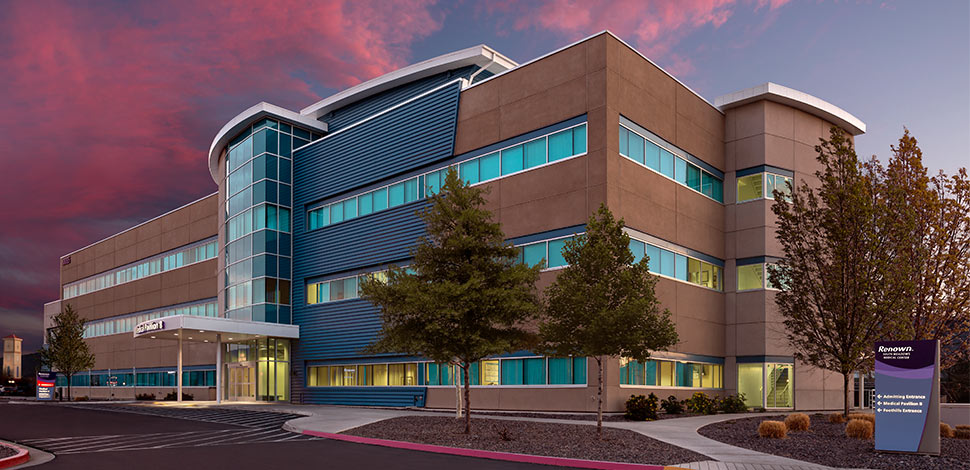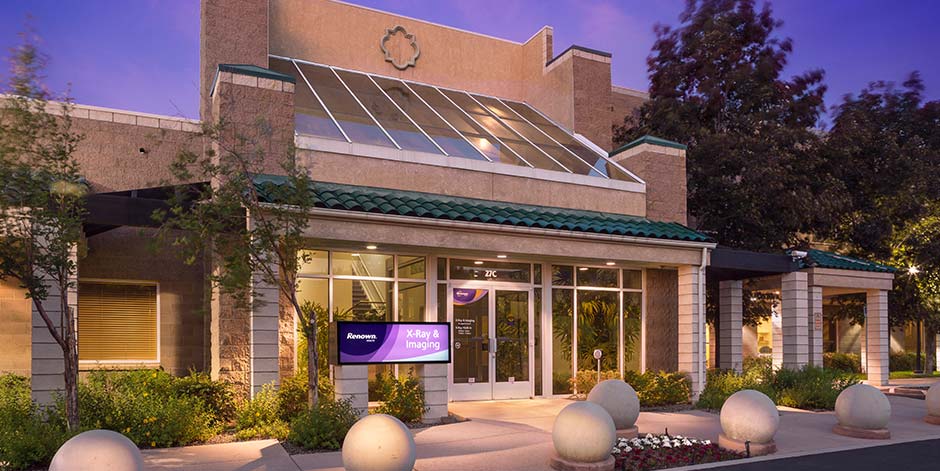Buscar
Results for 'imaging'
Clear-
 Renown Health X-Ray and Imaging - South MeadowsRenown Health X-Ray and Imaging - South MeadowsHorarios
Renown Health X-Ray and Imaging - South MeadowsRenown Health X-Ray and Imaging - South MeadowsHorarios
Lun. a dom.7 a.m. - 7 p.m. -
 Renown Health X-Ray And Imaging - South McCarranRenown Health X-Ray And Imaging - South McCarranHorarios
Renown Health X-Ray And Imaging - South McCarranRenown Health X-Ray And Imaging - South McCarranHorarios
Lun. a vie.8 a.m. - 4:30 p.m.Sáb. y dom.CerradoClosed for LunchNoon - 1:30 p.m. -
Supervisor of Imaging
Full Time - Eligible for Benefits200251 Imaging DiagnosticSwing -
Departamento destacado: Radiología intervencionista
National Radiologic Technology Week is from Nov. 5-11, 2023. Join us in celebrating Renown's Interventional Radiology department!Try to put yourself in the shoes of someone who is told that they have a massive blood clot in their lung, someone who needs a biopsy to determine the next steps of their care, someone facing a stroke or brain aneurysm or someone who needs a catheter to receive treatment such as chemotherapy. You may immediately think that an intense and intimidating surgery is on the horizon. What if, instead of surgery, your care teams were able to use the necessary tools to treat your blockage or administer your medicine with an image-guided procedure? That’s precisely what the Interventional Radiology (IR) team at Renown Health does. Behind the doors of this department is where you’ll find a team of highly skilled individuals who operate like a well-oiled machine, ensuring that each procedure is executed with precision and care. Their commitment to excellence knows no bounds as they provide essential interventions to patients of all ages, from the tiniest newborns to the elderly. Their mission extends beyond diagnostic and therapeutic procedures; they are experts in understanding and serving the ever-evolving needs of their patients. Minimally Invasive, Maximally Impactful With their advanced expertise, our IR teams at both Renown Regional Medical Center and Renown South Meadows Medical Center harness the power of X-ray, CT and ultrasound technologies to navigate their way through life-saving minimally invasive procedures, such as thrombectomies, angioplasties, stent placements, embolizations, catheter and drain insertions and needle biopsies. In the world of medicine, Interventional Radiology often offers an alternative to traditional surgical methods, reducing the risk of hospitalization and helping patients embrace recovery more quickly. Our IR teams have a diverse and busy daily work life in order to make these complex and life-saving interventions happen – and they all have each other’s backs to ensure that every patient gets the care they deserve. “Every day is different, and no two days are alike,” said Ryan Nunes, Specialty Procedure IR Technologist at Renown Regional. “The day can start off first thing in the morning with several emergent cases, such as ruptured brain aneurysms to brain blockages. We all work really well together; we help each other out and come together to do things as a team.” Like every other team at Renown, patient well-being is always a number one priority. The IR department takes this commitment seriously, upholding the highest standards of ethics and safety. “We start the day by preparing rooms and making sure they are well-stocked, checking that all devices are working, performing safety checks and making sure the entire team is well-prepared for whatever cases come through the door,” said Aubrey Goldsmith, Supervisor of Clinical Nursing in IR at Renown Regional. “We have routine cases like drain placements, biopsies, line placements and more, and we also have life-threatening cases that come at a moment’s notice. Our nurses are responsible for monitoring patients throughout the procedure to make sure they are doing well the entire time and are there to respond if the patient has a decline.” "After completing the prior assessment of each patient, we look for any medical problems the patient may have before confirming it is safe for the patient to have procedure done,” said Brandon Hartwig, Interventional Radiology RN at Renown South Meadows. “We work closely with the physicians on all our cases while assessing each patient, going through labs and vitals and personalizing the procedure for each patient.” Even though the procedures they oversee are minimally invasive, the IR team understands that any procedure, regardless of the severity, can be incredibly frightening for any patient. Their best tool for handling patient anxieties? Communication. "The best thing we can do to reduce anxieties and fears in patients is to have communication with them to ensure they know what is going on and what to expect,” said Megan Rios, IR Technologist at Renown Regional. "We set clear expectations for the patients and give reassurance throughout the entire procedure.” "All of our team members are very attentive to our patients when it comes to potential fears and anxieties that they may have,” added Jazmynn Kimsey, IR Technologist at Renown Regional. “We always take the extra time to listen to our patients and break things down, explaining every step before, during and after the procedure.” Knowledge sharing is also a crucial part of the IR process. No patient will ever have to wonder, “what exactly is going on here?” “We provide each patient with education and advocacy throughout the process,” said Blaire Henderson, Interventional Radiology RN at Renown Regional. “We ensure every patient is as comfortable as possible at all times.” “When it comes to procedures, patients tend to be scared and nervous,” added Ryan Nunes. “The silver lining to what we do is that it is all done through very small openings of the skin, and we all explain this to patients. Most procedures we do are done under moderate sedation which helps put the patient more at ease.” In a world where advanced medical care meets the human touch, the IR team exemplifies Renown’s commitment to making a genuine difference in the health and well-being of everyone they serve.
Read More About Department Spotlight: Interventional Radiology
-
Manager of Customer Engagement - Imaging
Full Time - Eligible for Benefits100631 Engagement Center AdminDay -
Departamento destacado: Special Procedures
Chronic pain can be one of the most distressing feelings someone may encounter – and more likely than not, you know someone who is managing their pain as a part of their healthcare journey. In fact, according to the Centers for Disease Control and Prevention, about 1 in 5 U.S. adults have experienced chronic pain in recent years. One of the most common methods of treating pain is through prescription pain medications; however, with the rise of the opioid epidemic across the country, leveraging other interventions to help patients manage their chronic pain has become increasingly more important. What if there was a way to treat pain directly without the automatic need for pain medication? Luckily for patients in northern Nevada, our Special Procedures department at Renown Rehabilitation Hospital specializes in exactly that: interventional pain mitigation sans painkillers. With nearly 95% of their patients who come in with pain-related mobility issues being able to physically walk out of the hospital after their treatment, much-needed relief is clearly in store. Tight-knit and forever-caring, the Special Procedures team knows how to transform the purpose of pain management. A Penchant for Pain Alleviation Renown's Special Procedures team offers a wide variety of pain management solutions that are uniquely tailored to each individual patient’s needs. With the help of a team of 14 attentive nurses, interventional radiology technologists and a surgical technician – plus a dedicated patient access representative ensuring everything goes smoothly behind-the-scenes – these lifechanging interventions include: Epidurals (including steroid epidurals) Nerve blocks Ablations Tenotomies Spinal cord stimulator trials Peripheral nerve stimulator trials The nurses on this specialized team guide patients before, during and after their procedures, making sure they are at ease throughout the entire process. Each nurse emulates both expertise and empathy to help light the path towards healing. “Before each procedure, we get the patient’s vitals, health history and work with the doctor to answer any questions they may have about what is going to happen in the procedure room,” said Michon Edgington, RN. “After they’re all done, they come back to me, and I make sure they are ready to go home by educating them on their discharge. Our goal is to get them back to their families very quickly.” “In the actual procedure room, we perform safety checks, do charting, prepare the sterile tray for the doctor and give medication for conscious sedations, all while consistently monitoring the patient and helping the doctor out along the way to help the procedure go well,” added Shannon Boelow, RN. This team’s dedicated imaging professionals harness expertise that goes beyond capturing images. Their skillful utilization of X-ray technology serves as a guide for doctors administering treatments for pain – and according to our own physicians, our imaging technologists are some of the best in the business. “Our X-ray skills here are specialized,” said Julie Smith, Imaging Lead. “Visually, the doctor needs to see what’s going on inside the body so they can accurately place needles and steroids. We all work together collectively and work with each doctor to accommodate their preferences, helping the treatments go much faster and minimizing the patient’s exposure to radiation.” Serving as the ideal representation of both precision and support, the surgical technician on this team is an important collaborator in the procedure room, helping to ensure the success of every interventional procedure with a meticulous eye for detail. “As the Special Procedures surgical technician, I get the room ready with all the necessary instruments, including making sure everything is sterile,” said Carrie Crow, Surgical Technician. “I enjoy keeping the team organized.” Overseeing it all are the physicians, who are eternally grateful for the team for the life-changing interventions they offer every day. “Our physicians are so phenomenal,” said Brittney Summerfield, Manager of Nursing. “They are very supportive and collaborative, and they always do the right thing. They have total confidence in us.” Seeing patients walk out of the hospital happy and healthy is a driving motivator for this team. Whether they had significant experience in pain management or were ready for a completely new challenge, each team member comes to work every day inspired to move mountains. “I had worked in pain management in other facilities, and I was extremely excited to come here and solely focus on pain,” said Jodi Eldridge, Supervisor of Special Procedures. “I enjoy seeing the patients so happy when they leave no longer in pain. I feel immediate gratification, because you truly feel like you’re doing something big for the patient. It’s very rewarding.” “I decided to come work here because I worked in the inpatient setting for a long time, and I was ready to see a different side of healthcare and provide a different type of care to our community; plus, my coworkers are the best,” added Lisa Dunnivant, RN. There’s no question that the realm of pain management is a delicate one – and there is no team better suited to take on that challenge than Special Procedures, working harmoniously to bring relief and a renewed sense of livelihood for every patient they serve. “Some people believe pain management is just all about pills, and that is simply not true,” said Carrie Crow. “Our procedures are yet another way to help them manage their pain and find relief.”
-
Medical Assistant
Sign On Bonus - $2,000Full Time - Eligible for Benefits209278 PET CTDay -
A Fighting Chance at 24 Weeks Sloans Story
Most babies weigh just one pound and are roughly the size of an eggplant when they reach 24 weeks of development inside the womb. It is a crucial stage when internal organs begin functioning, and the babies' respiratory and central nervous systems are still developing. So, in November 2021 when Kallie Johnson experienced a premature rupture of amniotic fluid around this point in her pregnancy, her care team in Winnemucca decided to transport her via Care Flight to Renown Regional Medical Center. The team at Renown Children’s Hospital immediately began discussing the risks of delivering at 24 weeks with the Johnson family. Moving Forward with Hope Knowing the stakes, Kallie remembers never feeling rushed to decide about delivering her baby preterm. “I felt educated and supported by my care team at Renown throughout our entire stay, starting with the education they provided about what it meant to deliver my baby early,” Kallie said. “The team really helped me make the best decision for myself and my family.” Together, Renown employees and the Johnson family moved forward with a healthy set of nerves and a powerful feeling of hope. Weighing in at one pound 11 ounces, Sloan entered the world on Nov. 19, 2021, via emergency Cesarean section. Her birth was classified as a micro preemie because she was born before week 26 of pregnancy and so small that she fit inside the palm of her father Sterling’s hand. A full-term pregnancy is classified as reaching 39 weeks. A Fighting Chance Called a fighter by many Renown Children’s Hospital care team members, Sloan spent over five months in the neonatal intensive care unit (NICU). She was placed on a ventilator, fed through a feeding tube and monitored 24/7, overcoming daily challenges with the Renown team and her family. As a result of being born prematurely, Sloan developed a grade one brain bleed and a congenital heart defect called patent ductus arteriosus, a persistent opening between two major blood vessels, causing too much blood to flow to the lungs and heart. To meet the oxygen needs of her tiny lungs, Sloan was intubated and developed a severe oral aversion and high-arched palate as a result. The effects would lead to difficult developmental and physical challenges that she still conquers today. Yet, with the help of her care team – including physical, occupational and speech therapists, dieticians and doctors – Sloan continues to make progress every day.
-
Why Your First Mammogram at 40 is a Vital Health Priority
A mammogram may not be on the top of your to-do list when you turn 40, but it needs to be. The American College of Obstetrics and Gynecology recommends a first mammogram at age 40, however you may need one earlier, so talk with your provider about your breast cancer risk. The purpose of a first time or baseline breast screening, is to get an accurate image of your breasts for future comparisons. Amber Snow, Supervisor of Renown Health Imaging, tells us why it’s important to get a baseline mammogram and what to expect during your visit. Mammogram Screenings Save Lives Simply put, a mammogram is a low-dose x-ray image of your breast from two views: top to bottom and side to side. A yearly screening reduces your risk of dying from breast cancer. Mammograms can detect signs of breast cancer even before you can see or feel it. That’s why it’s important to get a first- time mammogram. About 85% of breast cancers happen to those with no family history of it and in the U.S., one in eight women will develop breast cancer. Unfortunately, the two main risk factors for breast cancer: being female and aging. “Your baseline screening is important when you’re young, so that we know when changes occur,” explains Snow. “We compare your current mammogram to all your previous ones to know if anything changes year to year.” If you are under 40, talk to your provider about getting a formal risk assessment to see if a screening is right for you. If you have a family history of breast cancer a mammogram before age 40 or additional testing may be recommended for you. 3D Mammogram Technology Renown Health uses the latest 3D mammogram technology allowing our radiologists to see early changes in your breast tissue. This also reduces the number of false readings compared to traditional mammograms. While breast screening technology has improved, it is not uncommon to get called back after your first mammogram. According to the American Cancer Society, fewer than 10% of women called back for further testing have been found to have cancer. Reasons for being called back for further imaging include: Dense breast tissue, which can make it hard to see tumors A cyst, mass or unusual tissue is seen A possible area of concern needing another, closer look Preparing for Your Mammogram For an accurate image of your breasts do not wear deodorant, powders or lotions, as they can make it difficult to read your breast images. This is what will happen during your breast screening: A gown will be given to you and you will go to a private area to undress from the waist up, putting on the gown. You will then be escorted to the imaging room and a care team member will place one of your breasts between two plates. The plates will flatten to allow the most breast tissue to be seen and you will feel a firm pressure. You will be asked to hold your breath while the image is taken. An adjustment will be made to the plates to get a side view of the breast. The plate adjustments and images will be done on your other breast. Typically, a mammogram appointment is quick – only lasting about 15 minutes. Be Your Breast Friend While breast screenings are important, it’s also key that you know how your breasts normally look and feel. A monthly self-exam to check for lumps is essential, as breast cancers are often found during a routine self-exam. Remember your hormone levels change monthly, with your breast feeling tender and swollen right before your period. It’s best to perform a breast exam the week after your period after the swelling is gone. To avoid breast tenderness, this is also the best time for a mammogram.
Read More About Why Your First Mammogram at 40 is a Vital Health Priority
-
Renown Children's Orthopedics & Scoliosis
The optimum care for your child begins with the right diagnosis. Pediatric Orthopedics and Scoliosis at Renown Children's Hospital has the latest low-dose radiation imaging options for monitoring your child's growing bones. Combined with 3D imaging software, we can accurately diagnose injuries and diseases while developing an individualized care plan to treat your child.






